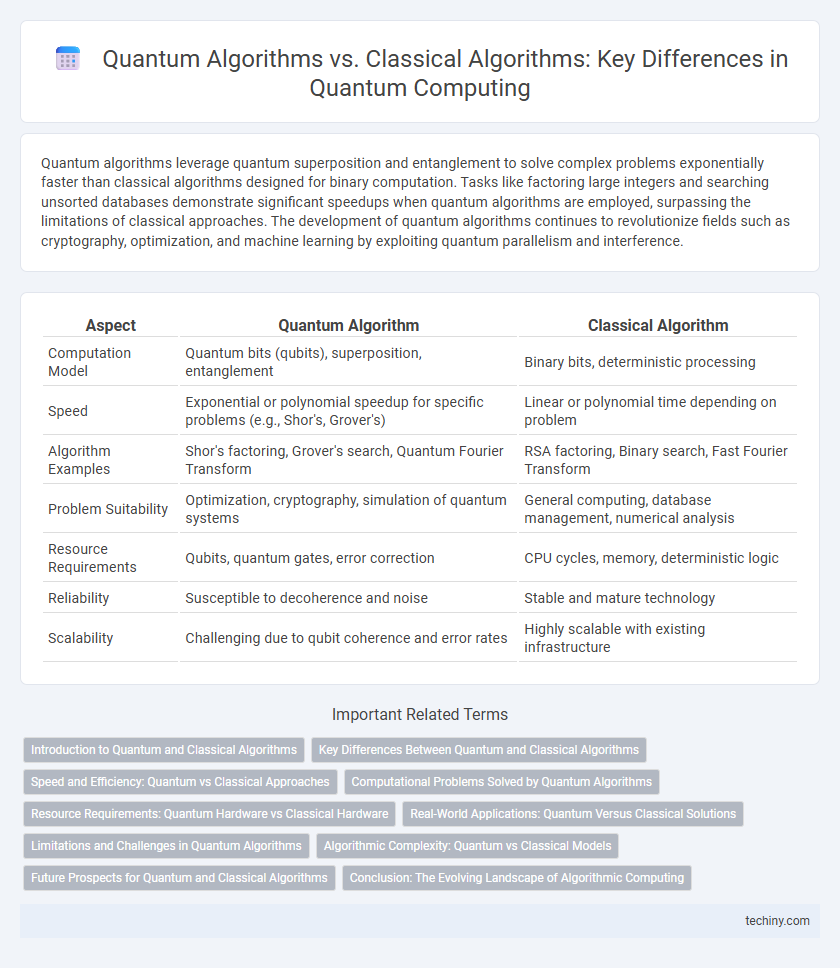Quantum algorithms leverage quantum superposition and entanglement to solve complex problems exponentially faster than classical algorithms designed for binary computation. Tasks like factoring large integers and searching unsorted databases demonstrate significant speedups when quantum algorithms are employed, surpassing the limitations of classical approaches. The development of quantum algorithms continues to revolutionize fields such as cryptography, optimization, and machine learning by exploiting quantum parallelism and interference.
Table of Comparison
| Aspect | Quantum Algorithm | Classical Algorithm |
|---|---|---|
| Computation Model | Quantum bits (qubits), superposition, entanglement | Binary bits, deterministic processing |
| Speed | Exponential or polynomial speedup for specific problems (e.g., Shor's, Grover's) | Linear or polynomial time depending on problem |
| Algorithm Examples | Shor's factoring, Grover's search, Quantum Fourier Transform | RSA factoring, Binary search, Fast Fourier Transform |
| Problem Suitability | Optimization, cryptography, simulation of quantum systems | General computing, database management, numerical analysis |
| Resource Requirements | Qubits, quantum gates, error correction | CPU cycles, memory, deterministic logic |
| Reliability | Susceptible to decoherence and noise | Stable and mature technology |
| Scalability | Challenging due to qubit coherence and error rates | Highly scalable with existing infrastructure |
Introduction to Quantum and Classical Algorithms
Quantum algorithms leverage principles of superposition and entanglement to solve problems exponentially faster than classical algorithms. Classical algorithms operate on binary bits using deterministic or probabilistic methods within classical computing architectures. The fundamental difference lies in quantum algorithms' ability to explore multiple solution spaces simultaneously, offering significant advantages in optimization, cryptography, and simulation tasks.
Key Differences Between Quantum and Classical Algorithms
Quantum algorithms leverage superposition and entanglement to process vast solution spaces exponentially faster than classical algorithms, which operate on deterministic bits. Quantum algorithms, such as Shor's and Grover's, demonstrate polynomial or even exponential speedups for specific problems like integer factorization and unstructured search. In contrast, classical algorithms rely on sequential or parallel bit manipulation with limited computational complexity scaling, making them less efficient for particular classes of problems.
Speed and Efficiency: Quantum vs Classical Approaches
Quantum algorithms leverage qubits' superposition and entanglement, enabling exponential speedup for specific problems compared to classical algorithms that rely on binary bits. Algorithms like Shor's and Grover's demonstrate significant efficiency in factoring large numbers and searching unsorted databases, surpassing classical counterparts in computational complexity. Classical algorithms remain efficient for many tasks, but quantum approaches drastically reduce execution time for problems with large input sizes and complex structures.
Computational Problems Solved by Quantum Algorithms
Quantum algorithms excel at solving specific computational problems that are intractable for classical algorithms, such as integer factorization and discrete logarithms, enabling breakthroughs in cryptography through Shor's algorithm. Grover's algorithm offers quadratic speedup for unstructured search problems, surpassing classical linear search efficiency. These quantum computational advantages highlight the potential to optimize complex problem-solving in fields like optimization, simulation of quantum systems, and machine learning.
Resource Requirements: Quantum Hardware vs Classical Hardware
Quantum algorithms require qubits and quantum gates that operate under principles like superposition and entanglement, necessitating highly specialized quantum hardware with extreme coherence times and error correction capabilities. Classical algorithms run on silicon-based processors relying on binary bits, benefiting from mature, scalable classical hardware architectures with established manufacturing processes. Resource demands for quantum hardware remain substantially higher due to cooling requirements and quantum error rates, whereas classical hardware offers robustness and accessibility for large-scale computations.
Real-World Applications: Quantum Versus Classical Solutions
Quantum algorithms leverage principles like superposition and entanglement to solve complex problems exponentially faster than classical algorithms in fields such as cryptography, optimization, and drug discovery. Classical algorithms remain efficient for large-scale data processing and tasks requiring robust error correction and stability. Real-world applications often combine quantum solutions for speed and innovation with classical approaches for scalability and reliability.
Limitations and Challenges in Quantum Algorithms
Quantum algorithms face significant limitations such as error rates caused by quantum decoherence and the scarcity of fault-tolerant qubits, which hinder their practical implementation and reliability compared to classical algorithms. The complexity of designing scalable quantum circuits and the current lack of universally applicable quantum algorithms restrict their advantage over classical counterparts in solving a broad range of problems. Furthermore, quantum algorithms often require extensive quantum resources and precise error correction, posing challenges in hardware development and increasing computational overhead.
Algorithmic Complexity: Quantum vs Classical Models
Quantum algorithms leverage superposition and entanglement to achieve exponential or polynomial speedups in solving specific problems compared to classical algorithms, which rely on deterministic or probabilistic processes constrained by classical computational complexity classes like P and NP. Notable quantum algorithms such as Shor's for integer factorization and Grover's for unstructured search demonstrate reduced time complexity, outperforming their classical counterparts characterized by exponential and linear time complexities, respectively. This fundamental difference in algorithmic complexity highlights the promise of quantum computational models to tackle intractable problems previously limited by classical resource constraints.
Future Prospects for Quantum and Classical Algorithms
Quantum algorithms leverage principles like superposition and entanglement to solve complex problems exponentially faster than classical algorithms in areas such as cryptography, optimization, and machine learning. Classical algorithms remain essential due to their reliability, well-understood structures, and efficiency on current hardware, ensuring ongoing advancements through hybrid quantum-classical models. Future prospects emphasize integrating quantum algorithms into classical frameworks to harness quantum speedup while addressing error rates and scalability challenges.
Conclusion: The Evolving Landscape of Algorithmic Computing
Quantum algorithms harness principles of superposition and entanglement to solve specific problems exponentially faster than classical algorithms, particularly in areas like cryptography, optimization, and database search. Classical algorithms remain efficient for many tasks relying on deterministic logic and well-established computational models, but their limitations are increasingly apparent as problem complexity grows. The evolving landscape of algorithmic computing highlights a paradigm shift where quantum algorithms complement classical approaches, driving innovation and expanding the boundaries of computational capability.
Quantum Algorithm vs Classical Algorithm Infographic

 techiny.com
techiny.com